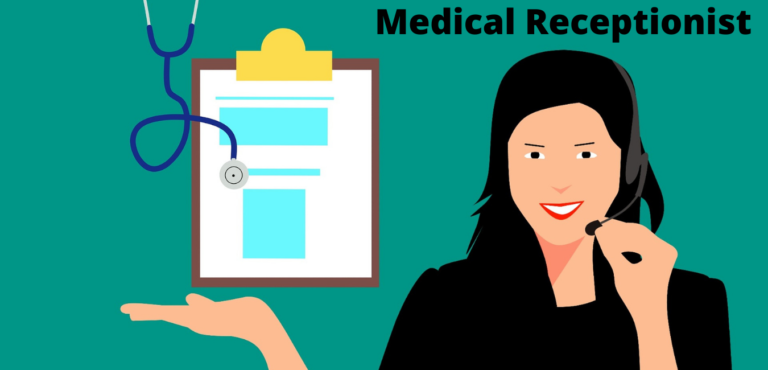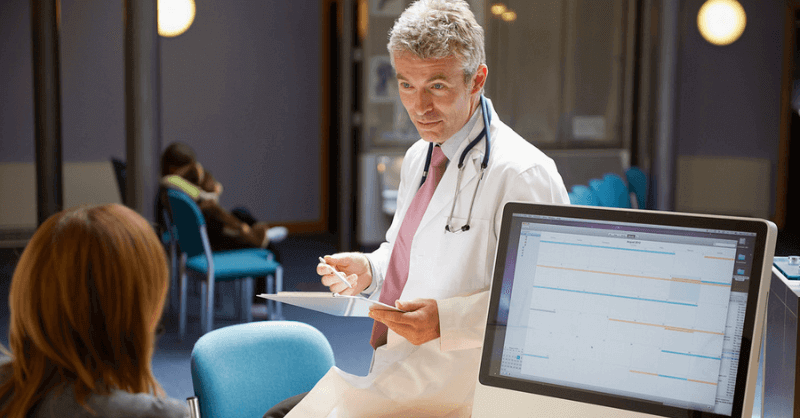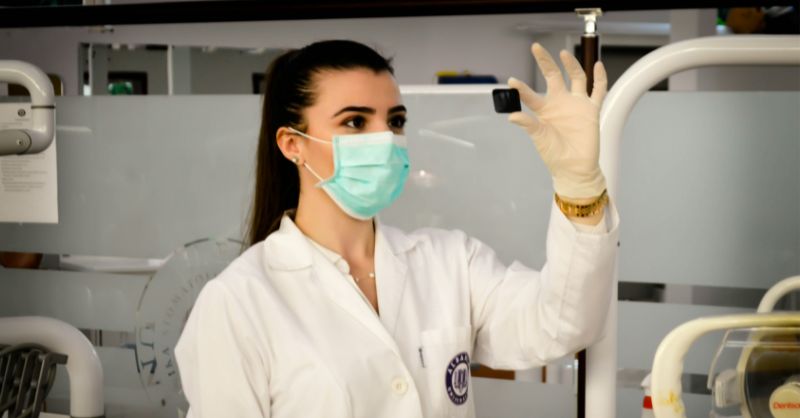One of the most familiar faces in a medical facility is a Medical Receptionist. If you want to describe a medical receptionist with a single word, it should be “the coordinator” of medical staff and patients. A medical receptionist has a lot of duties on their plate with no room for mistake. So, they need to acquire some extraordinary medical receptionist skills before getting this job.
Table of Contents
What are Medical Receptionist Skills?
Medical receptionist skills, such as attention to detail and customer service, are needed to function efficiently in a medical facility. You may have picked up some of these skills on the job or through your education. You will need those skills as a medical receptionist to be able to manage your day-to-day duties, such as greeting and checking in patients.
Some other daily job responsibilities of a medical receptionist include –
- Answering incoming calls
- Routing calls to appropriate personnel
- Welcoming and checking in all patients for office appointments
- Handling paperwork for patients to fill out
- Scanning insurance cards
- Entering all demographic details into the electronic health record
- Entering referrals for office visits into the electronic health record
- Moving patients through a pre-determined schedule of appointments at a physician’s office.
There will be more tasks depending on the size of the organisation or work requirement. But one thing is certain, they all require a certain skill set to do these efficiently. That’s where medical receptionist skills come in.
Why Medical Receptionist Skills are Important on
Your Resume?
The medical industry has a high demand for administrative staff. But you do need to have the right qualifications and competencies to get hired. So make sure to list the most applicable skills on your resume and cover letter when applying for a job as a medical receptionist. Employers want to know that you can do clerical tasks and efficiently communicate with patients. Initially, they will find out about your hard and soft skills by reading your resume and cover letter.
So based on your cover letter and resume, the employer will decide if you have enough competency for a medical receptionist. They will consider you for the receptionist role if you showcase the right medical receptionist skills.

10 Best Medical Receptionist Skills For Your Resume
A list of the most key aspects for a medical receptionist can be found below. The best skills were ranked based on the percentage of medical receptionist resumes that include them. Medical records, for example, were listed as a skill on 11.2 percent of medical receptionist resumes. Let’s look at the skills that a medical receptionist requires to be effective in the workplace.
1. Organising
Since most of your duties would enable you to remain organised, one of the most valuable skills of a medical receptionist is organisation. It is important to maintain orderliness when doing several activities at once, such as checking in patients, taking phone calls, and keeping track of schedules and medical records. You are responsible for having your desk organised as a receptionist so that you can easily assist patients and team members.
2. Prioritising Task
There will be a lot of tasks to handle at a time for a medical receptionist. Among all of the tasks, he/she needs to find out which is more important than others. After sorting out now it’s time to hand over the required task to the relevant department or staff where the task belongs. Otherwise, he or she can leave essential tasks unfinished, causing considerable disruption to the office’s operations.
As a result, the receptionist must be able to prioritise tasks and complete them according to their priority.
3. Customer Assistance
One of the responsibilities of the Medical Receptionist as a front desk person is to attend to patients and clients. To be able to provide professional services to customers, you must have a strong understanding of customer service.
To work at a medical facility’s front desk, medical receptionists must have outstanding customer service skills. You are in charge of meeting them and having a pleasant first impression so that they have a positive experience. Making eye contact and smiling warmly to welcome patients as they enter the office, as well as discussing any concerns they may have, are examples of this.
4. Communication Abilities
It goes without saying that someone in a people-oriented job needs outstanding communication skills since it allows for a free flow of knowledge and fosters understanding.
Medical receptionists with strong verbal and written communication skills are in high demand. To welcome patients, take phone calls, and converse with colleagues, medical receptionists use verbal communication. They send letters, schedule patients, and dictate memos using written documents.
5. Multi-Tasking
In the medical field, there can be a lot of items on a person’s desk at any given time, all of which demand attention. Instead of being frustrated, the receptionist would need to devise a method of doing several duties at the same time to complete further assignments and keep the office running smoothly.
Not being able to multitask efficiently can have some serious repercussions in a healthcare facility. In healthcare and medical facility, it is common to have multiple time-sensitive issues that need to be dealt with simultaneously. That’s why it is one of the most important medical receptionist skills.
6. Problem Solving
One of the most important duties of a medical receptionist is to respond to questions and concerns from patients and visitors about the clinic’s services.
The receptionist must be able to offer solutions to perform this job effectively. Often patients who require assistance in a medical facility are overwhelmed, or they are worried. As a result, they depend on the receptionist to guide them and provide a solution. To successfully answer patient questions or handle complaints and settle their concerns, a medical receptionist must be able to solve problems effectively.
7. Technical Skills
The receptionist must be able to use electronic devices on the job effortlessly, such as the phone and computer.
Medical receptionists must be flexible in their approach to emerging technologies. Employers are looking for medical receptionists who can deal with scheduling software and patient charting software. It’s critical to stay current with these software programs, particularly because a computer is one of the most important resources you’ll use as a medical receptionist.
8. Time Management Skills
It’s important to be as efficient as possible when dealing with patients and handling their paperwork so that they don’t have to wait too long. The receptionist must have excellent time management skills to attend to patients and customers as soon as possible.
9. Interpersonal Skills
The ability to communicate with people on a one-on-one basis is essential for the completion of tasks. The receptionist has to be able to easily connect to clients with their interpersonal skills. Without good interpersonal skills, a receptionist can not do their job well, especially a medical receptionist.
10. Anger Management Skills
Dealing with a variety of people regularly, some of whom may be challenging necessitate the receptionist’s ability to remain calm in stressful situations.
Since it affects client care and operations, customer service may either make or break an establishment’s growth.
A medical receptionist with the skills mentioned above is a dream come true for every employer because they are sure to add value to the company, which is why they should be included in your resume.
How to Write Skills for a Medical Receptionist Resume?
When it comes to putting your skills on your resume to apply for a medical receptionist, you should take the following steps:
1. Investigate the Organisation Where You Want to Work
Begin by learning about the clinic’s or hospital’s corporate culture. To find skills that complement your own, look for keywords in the work posting, the company’s website, and the company’s social media profiles.
2. List any Skills You have as a Medical Receptionist That are Important
In the skills section of your resume, list your skills that complement those listed in the work posting. Since certain firms use candidate monitoring software, the resume can be scanned for those keywords before it reaches a hiring manager.
3. As a Medical Receptionist, Explain Your Professional Abilities
When outlining each of your job duties and accomplishments, you should include your skills. As a medical receptionist, it’s important to show your abilities. Employers also want to see examples of how you applied your specified skills in previous positions. Skills on a resume aren’t just for resume scanners; they’re also for impressing hiring managers with your achievements.
4. Be Certain You’ve Included Both Soft and Hard Skills
It’s important to have both soft and hard skills, such as communication and customer support, as well as familiarity with specific computer applications. Employers would want to see that you are capable of doing the work, which requires both hard and soft skills.
5. Combine Your Abilities
Include your experience as a medical receptionist in your resume. For example, if you are a medical receptionist with experience using multi-line phones and patient charting software, you might include them in your description at the top of your resume. It’s critical to include more than a bulleted list of your qualifications. So, to show employers how qualified you are as an applicant, find ways to incorporate them into your resume.
Medical Receptionist Skills Checklist
Here’s a handy medical receptionist skills checklist to help you perfect your resume and enhance your skillset.
- Organisational skills
- Prioritising task
- Customer assistance
- Communication skills
- Multi-tasking ability
- Problem solving ability
- Technical skills
- Time management skills
- Interpersonal skills
- Anger management skills
- Able to empathize with others
- Ability to work under pressure
What can You do to Boost Your Medical Receptionist Skills?
You may already have a few of the crucial skills to become a medical receptionist, but there’s s always room for more improvement. Here are a few ways to boost your medical receptionist skills.
1. Take Advantage of On-the-job Training
Since you are immediately applying what you learn to what you do, on-the-job training is one of the most important ways to develop your receptionist skills. When you’re being educated, make notes about your work as a medical receptionist so you can remember how what you’re learning applies to your job in a meaningful and tangible way.
2. Look for a Mentor
It may be helpful to have a mentor, such as a senior medical receptionist, to assist you. A mentor will teach you new skills, such as how to use a specific application, as well as provide insight into the intent and direction of working as a medical receptionist. Mentoring is a fantastic way to learn new skills and make new connections in your profession.
3. Continue to Educate Yourself on Your Own Time
Outside of the workplace, learning more about being a medical receptionist is just as beneficial as the work you do on the job. Attending lectures, courses, and conferences will help you learn new skills and develop existing ones. You will also be able to network as a result of this.
Related: Everything You Need To Know About A Medical Receptionist
Concluding Note
A good receptionist will make a big difference in how well a medical office operates. So, in order to get to know more about the tricks and to become a professional, you just need a proper guideline. A guideline such as Medical Receptionist Course.







 April 13, 2021
April 13, 2021









